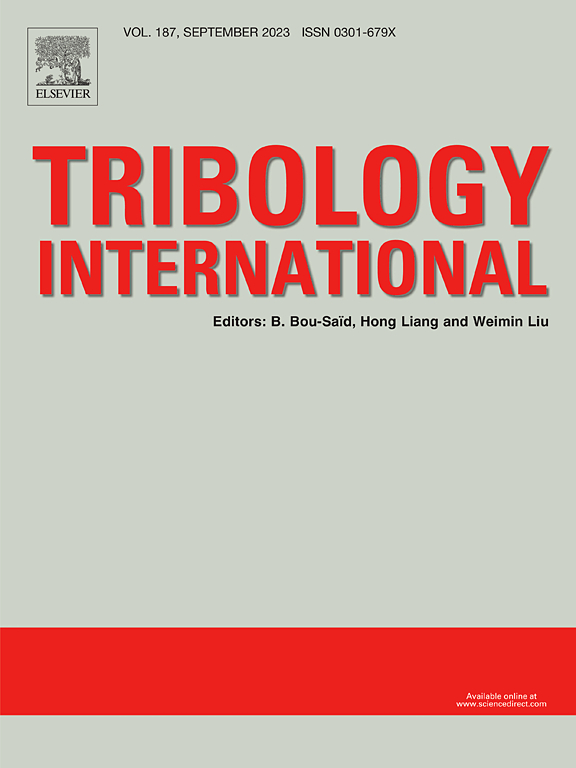Friction and wear maps of Mg-Er alloys with varying Er content
IF 6.1
1区 工程技术
Q1 ENGINEERING, MECHANICAL
引用次数: 0
Abstract
Several rare-earth (e.g. Y, Gd, Nd, Ce) additions have been investigated till date in magnesium alloys. However, limited efforts have been made to examine the influence of Erbium (Er) in Mg alloys. This study is designed to unravel the role of Er addition on wear and friction characteristics of Mg-Er alloys. As-cast Mg-Er (0.5–12 wt%) alloys were prepared and tested under dry sliding conditions with varying normal loads (5 N to 100 N) and sliding speeds (0.01 m/s to 0.1 m/s). The results indicated that the addition of Er to Mg significantly improved the overall wear properties of the alloys. At higher Er content, a substantial decrease in severe wear rate region (75 %), while a ⁓ 40 % reduction in friction coefficient were observed. The formation of a protective tribo-oxide layer at the contact zone due to the increase in temperature from friction, combined with the strengthening effect of the Er-rich precipitates, contributed to enhanced wear resistance with Er addition. The surface energy of the Mg-12Er alloy was less than that of other Mg-Er alloys (⁓ 50 % reduction), causing reduced adhesion and abrasion wear and thus reducing the overall wear rate. Furthermore, it was observed that higher applied normal loads led to increased wear rates and friction coefficients, whereas with increasing sliding speed, the wear rate was reduced. Major wear mechanisms observed were abrasive, adhesive, plastic deformation, oxidation, and fatigue wear along with delamination.
不同铒含量的镁铒合金的摩擦磨损图
迄今为止,已对镁合金中添加的几种稀土(如 Y、Gd、Nd、Ce)进行了研究。然而,在研究镁合金中铒(Er)的影响方面所做的努力还很有限。本研究旨在揭示添加铒对镁-铒合金磨损和摩擦特性的影响。制备了铸态镁-铒(0.5-12 wt%)合金,并在不同法向载荷(5 N 至 100 N)和滑动速度(0.01 m/s 至 0.1 m/s)的干滑动条件下进行了测试。结果表明,在镁中添加 Er 能显著改善合金的整体磨损性能。当 Er 含量较高时,严重磨损率区域大幅降低(75%),摩擦系数降低了 40%。由于摩擦导致温度升高,在接触区形成了三氧化物保护层,再加上富含 Er 的沉淀物的强化作用,使得添加 Er 后的耐磨性得到了增强。Mg-12Er 合金的表面能低于其他 Mg-Er 合金(降低了 ⁓ 50%),导致粘附和磨损减少,从而降低了整体磨损率。此外,观察还发现,施加的法向载荷越大,磨损率和摩擦系数就越高,而滑动速度越快,磨损率就越低。观察到的主要磨损机制包括磨料磨损、粘着磨损、塑性变形磨损、氧化磨损和疲劳磨损以及分层磨损。
本文章由计算机程序翻译,如有差异,请以英文原文为准。
求助全文
约1分钟内获得全文
求助全文
来源期刊

Tribology International
工程技术-工程:机械
CiteScore
10.10
自引率
16.10%
发文量
627
审稿时长
35 days
期刊介绍:
Tribology is the science of rubbing surfaces and contributes to every facet of our everyday life, from live cell friction to engine lubrication and seismology. As such tribology is truly multidisciplinary and this extraordinary breadth of scientific interest is reflected in the scope of Tribology International.
Tribology International seeks to publish original research papers of the highest scientific quality to provide an archival resource for scientists from all backgrounds. Written contributions are invited reporting experimental and modelling studies both in established areas of tribology and emerging fields. Scientific topics include the physics or chemistry of tribo-surfaces, bio-tribology, surface engineering and materials, contact mechanics, nano-tribology, lubricants and hydrodynamic lubrication.
 求助内容:
求助内容: 应助结果提醒方式:
应助结果提醒方式:


